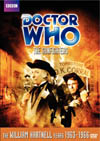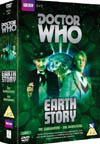The Gunfighters
 |
 |
 |
DVD NTSC
Region 1




|
DVD PAL
Region 2
Box Set


|
VHS Video
NTSC


PAL


|
|
(Doctor Who Story No. 25, starring William Hartnell)
- written by Donald Cotton
- directed by Rex Tucker
- produced by Innes Lloyd
- music: The Ballad of the Last Chance Saloon
by Tristram Cary,
Donald Cotton, and Rex Tucker,
sung by Lynda Baron and Peter Purves
- 4 episodes @ 25 minutes each:
- A Holiday for the Doctor
- Don't Shoot the Pianist
- Johnny Ringo
- The O.K. Corral
|
Story: Much to Steven and Dodo's initial delight,
the Doctor decides 19th century Tombstone, Arizona is as
good as anywhere to find a dentist to cure his broken tooth,
except that the Clanton gang has come looking for
Wyatt Earp and dentist Doc Holiday, and the stage is
set for some comedic but deadly mistaken identity.
With the Doctor's distaste for guns and violence coming
to the fore, will he be able to act as a deputy lawman
and keep the peace in the wild west?
|
|
DVD Extras include:
- Audio commentary by Peter Purves (Steven Taylor),
Shane Rimmer (Seth Harper),
David Graham (Charlie the bartender),
Richard Beale (Bat Masterson),
production assistant Tristan de Vere Cole,
and moderator Toby Hadoke.
- "The End of the Line" featurette (43 min.) on William Hartnell's
format-restless change-filled third year,
with Purves,
Maureen O'Brien (Vicki),
Anneke Wills (Polly),
former script editor Donald Tosh, and
fans Gareth Roberts and Ian Levine.
- "Tomorrow's Times - The First Doctor" press coverage featurette (14 min.)
hosted by Mary Tamm (Romana).
- Photo Gallery / Ballad montage
- Pop-up Production Note Subtitles
Buyers' Guide Review
by Martin Izsak
|
|
(A more in-depth analysis, containing "SPOILERS" and intended
for those who have already seen the program, can be accessed
here.)
|
This story has undeservedly been much maligned as
the worst William Hartnell story ever, an honour much more
suited to the story that wouldn't allow anything interesting to happen:
Donald Tosh's televised version of
"The Massacre" (story no. 22).
"The Gunfighters" certainly has its share of faults, yet it has
many redeeming pluses as well.
Let's start with acting. The acting is not great, but
mostly passable; thankfully its faults seem less glaring with each
repeat view of the story. Western American accents seem to be foremost
on the minds of the British cast, hampering their ability to
play their parts as naturally as they might otherwise have done.
Laurence Payne playing Johnny Ringo may not quite pull off
a convincing accent, perhaps because he rightly put more effort
into giving Johnny Ringo a more classic aura of Shakespearean
villainy, and almost single-handedly salvages a sense that there
is a serious threat here. Johnny is far more interesting to watch than
the Clanton clowns, but he sometimes comes off as a British creation,
not a particularly Western one. "The Gunfighters" would have needed
to improve on the acting front most by taking its antagonists more
seriously, and eliminating gags that don't work.
The "Doc" is in.
This story's saving grace "Ace in the Hole" is William Hartnell,
who for once is on hand for all the episodes, and puts in an incredibly
good showing, as the Doctor has many excellent scenes to get thoroughly
involved in. No matter how far off-track the rest of the story's
elements wander, I just absolutely love his character and
his performance in this one. The plot is actually fairly good here
in giving the Doctor, and his companions, a healthy helping of
interesting things to do.
And the final episode deserves a medal for the manner
and style of the Doctor's involvement here.
Any prosecuting Time Lords in the audience
should take note - he did not meddle! His assistance was "most
specifically requested, and not just by anyone, but by the man in
whom authority was vested!" The Doctor's character shines brightly
in this story, making well known his dislikes for guns, violence,
and alcohol, and showcasing his interest in seeing justice upheld. This
starts to sound like "The Gunfighters" was a great story, and perhaps it
could have been if these elements had been emphasized. However, the
Doctor's climactic scene is left hanging, as the cameras wander
away to cover a really lame version of action elsewhere instead,
and never get back to him.
The focus was definitely not on the story's true strengths.
As acting goes, we get about as good as anything from any
of Richard Martin's Doctor Who stories, but when it comes to
camera angles and shooting television, Rex Tucker is miles ahead,
(apart from said action at the very end which is totally lame).
Shots are well composed, and actors and cameras find their spots
on time and coordinate well. Sets and costumes are also well
done - and the Western setting is well realized in the limits of
the studios, with even a few live horses brought in to good effect.
The TARDIS does not make a spectacular entrance, materializing
off screen. Many season two and early season three stories have
kept us satisfied with a good effect, so perhaps it is excusable,
but a few too many season three stories are doing the TARDIS on
the cheap, particularly here in "the dregs".
The Ballad of the Last Chance Ratings
My biggest complaint has got to be the lyrical Ballad music,
which I believe to be the single largest factor leading to this
story's bad reputation. It kind of cements into place the
off-colour tone of the acting and creates all kinds of timing
problems for the drama that diffuse tension in scene after scene,
including cliffhangers.
Lynda Baron does manage to sing it all well enough, but she will
do better in the much more relevant role of Captain Wrack
in the early 80's story
"Enlightenment" (story no. 128).
Unlike the acting, the Ballad simply gets more nauseating and
nerve-"Wrack"-ing with repeat viewing of this story.
The obnoxious lyrics try hard to be part of the main story-telling,
but don't even stay true to the events in the script at hand,
completely forgetting who still has the law on their side
and who doesn't.
Well, "The Gunfighters" certainly isn't great, but a bit of polishing
by removal of the Ballad sections (or replacement with some of
Tristram Cary's very similar but totally instrumental piano pieces from
"The Dalek Masterplan" part 7)
might well leave you with a decent
Doctor Who adventure about a dramatic event in a historical setting
that is unique for this show, spearheaded by one of Hartnell's
most enjoyable performances. Even if this story doesn't rank
too highly in the season, it's mighty enjoyable, and still makes
fun repeat viewing.
At any rate, our endurance of "the dregs" of season three is now
finally over, and high quality returns to the stories of Doctor Who.....
This story is available on DVD and VHS video:
 |
 |
 |
DVD NTSC Region 1
for the North American market:

 in the U.S.
in the U.S.

 in Canada
in Canada
|
DVD PAL Region 2
Box Set

 for the U.K.
for the U.K.
|
VHS Video
NTSC

 for North America
for North America
PAL

 for the U.K.
for the U.K.
|
Comments on this article are welcome. You may contact
the author from this page:
Contact page

LYRATEK.COM
|
Read the Buyers' Guide Review for the next story:
"The Savages"

|
|








